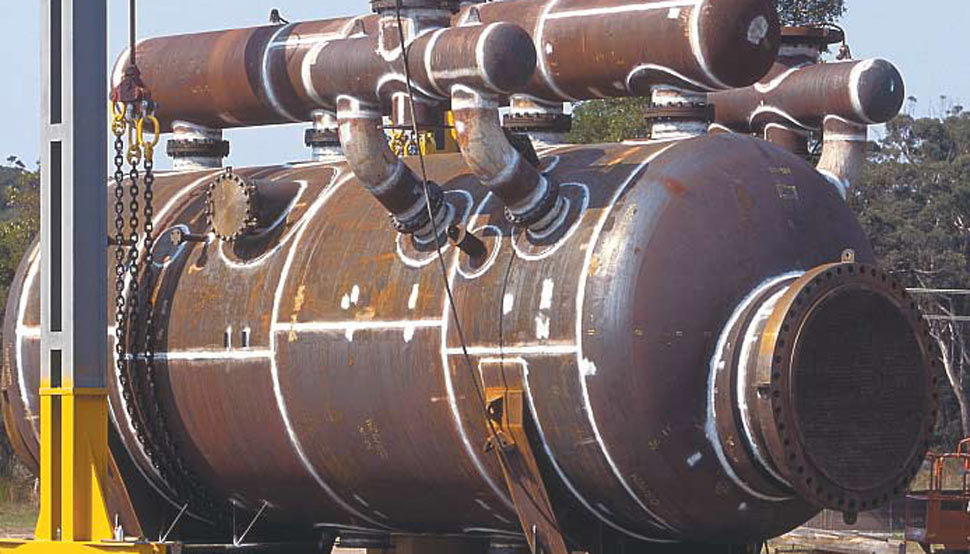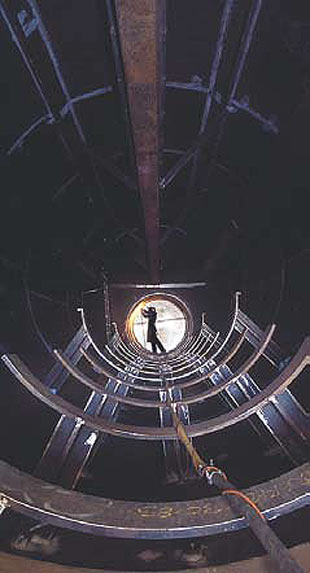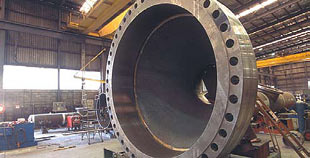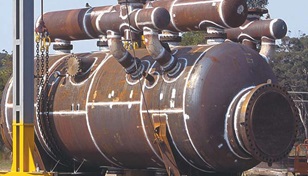WE Smith supplies pressure vessels for Woodside's Pluto LNG Project
Nearly 400 tonnes of Grade 7-490AL50 modified XLERPLATE® steel has gone into construction of propane vessels, which were designed by WE Smith.
Credentials:
Location: Burrup Peninsula, Western AustraliaClient: Woodside Pluto
Fabricator: WE Smith, Coffs Harbour
The fabrication of two sets of butted kettle heat exchangers and a propane re-boiler for a new LNG train continues a WE Smith relationship with Woodside which dates back to 1980.
LNG trains are massive processing facilities which function as giant freezers to cool gas pumped from under the sea to temperatures around minus 160 degrees Celsius. They reduce the gas to a liquid for easy shipping at just one six hundredth of its original volume.
The heat exchangers are among the largest that the Coffs Harbour, New South Wales fabricator, WE Smith has made in its 85 year history. The assembled propane re-boiler is 5 metres in diameter and 17 metres in length, while the butted heat exchangers are 4.1 and 3.3 metres in diameter and 15.3 and 11 metres in length respectively.
The heat exchangers will be barged to Newcastle or Brisbane then taken by ship to the Burrup Peninsula in Western Australia where Woodside is constructing a A$12 billion LNG processing facility. Gas will be transported onshore via a pipeline from the Pluto and Xena gas fields in the Carnarvon Basin 190km northwest of Karratha.
Woodside Pluto is set to become the world's fastest developed LNG project. From discovery of the gas field in 2005, production of first export shipments is expected in late 2010. Its output will make Woodside one of the world's biggest producers of LNG.
Nearly 400 tonnes of BlueScope's XLERPLATE® steel in modified pressure vessel grades has gone into construction of the process units, which were designed by WE Smith to meet throughput capacities required by Woodside.
Most of the steel was supplied by distributor OneSteel's Coffs Harbour branch on the NSW mid-north coast. However, in what proved to be a key decision, OneSteel with WE Smith also shipped some of the XLERPLATE® steel to a Japanese sub-contractor.
The Japanese company carried out specialised profiling and fabrication tasks then shipped the assemblies back to WE Smith's workshops where the fabrication process was completed.
"We have very close and continuing ties with BlueScope Steel," WE Smith Purchasing Manager Peter Higgins said. "Because of the special grades of pressure vessel steel and the tight deadlines specified by Woodside, we were speaking with BlueScope Steel's technical support specialists from the day we were first invited to tender for the project."
Since the capability to fabricate the five metre diameter semi-ellipsoidal dished ends for the heat exchanger kettles did not exist in Australia, WE Smith initially explored the possibility of having them fabricated in Japan from Japanese supplied steel.
Japanese fabrication shops had the capability to produce the dished ends to the required dimensions, but could not source the special grades of steel in the time required to meet WE Smith's deadline.
Unique Collaboration
In a unique collaboration, the specified 70mm thick plates of Grade 7-490AL50 Modified XLERPLATE® steel were shipped to the Japanese fabrication shop direct from BlueScope Steel. In Japan, they were profiled and hot spun to form the massive semi-ellipsoidal dished ends, then shipped back to WE Smith's workshops.
"Over the years we have been involved with most of Woodside's phased development on the Burrup Peninsula," WE Smith Project Manager for the Pluto train components, Stephen Gothard, said. "Woodside and our other customers know that if we have issues with fabrication we will resolve them and be totally transparent with the customer throughout that process."
The unique, year long fabrication project for the heat exchangers and propane re-boiler has involved the entire WE Smith workforce at one stage or another. Project Manager Stephen Gothard and Project Engineer Lucas Boogaard have guided a process which required all of WE Smith's specialised skills.
Various sub-assemblies fabricated over two shifts per day by workshop teams were subjected to exceptional quality assurance measures including non-destructive testing and hydro-testing which kept WE Smith's NATA accredited laboratory constantly engaged. The fabrication work involved XLERPLATE® steel in thicknesses ranging from 12mm to 70mm and tolerances as tight as 0.2mm. Surveyors were used to confirm the accuracy of the work.
WE Smith pressed and formed some of the thicker barrels required for the units after recently expanding its capabilities. It did this by acquiring specialised vertical rolling machinery with a 150mm maximum thickness capability from Western Australian steel fabricator Wenco.
WE Smith has a record of designing and producing Australia's largest heat exchanger units and has previously fabricated vessels three times as long and twice as heavy as the current units.




